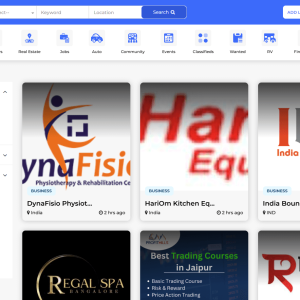A directory website is an online platform that makes it simple for users to locate and evaluate possibilities by classifying and listing companies, services, or resources within particular locations or categories.
Like the classic Yellow Pages, these websites serve as digital directories but offer more searchable and interactive capabilities. Local companies, eateries, real estate listings, job openings, and even specialist directories like those for wedding vendors or medical experts are just a few examples of the many industries and specialties that directory websites can cover.
Each entry on directory websites frequently has a comprehensive profile or listing that may include contact information, descriptions, ratings, reviews, photographs, and links to other websites or social media accounts.
A directory website’s objective is to link users to the services or information they are seeking, while also helping businesses increase their visibility. However, what are directory websites, how do they operate, and what makes them significant? Let’s examine directory websites in more detail.
What Is a Directory Website?
A systematic online catalog or list of websites arranged according to categories and subcategories is called a web directory. In contrast to search engines, which use algorithms and keywords to index websites, online directories usually employ human editors who manually evaluate, classify, and list webpages.
Web directories can be used for a number of reasons. They might be general and cover all types of websites, or they can be specialized. General directories and niche directories are the two main categories of web directories.
A vast range of subjects, industries, and geographical areas are covered by general directories. On the other hand, niche directories concentrate on a particular subject, sector, or area, offering a more specialized and focused listing for customers searching for very particular information.
How a Web Directory Works?
Imagine a library with websites organized on shelves in place of books. In essence, that is a web directory! This is how it operates.
Organization by topic: Websites are grouped into pertinent categories and subcategories by online directories. This greatly simplifies information browsing compared to navigating the untamed web.
Human editors, not bots: Web directories rely on human editors to curate material, in contrast to search engines that utilize automation to explore the web. Editors make sure the websites offer a good user experience and are pertinent to the category.
Submission process: Website owners have the option to pay or submit their site for inclusion in a directory, usually for free. After that, editors check the submission for quality and fit.
Browsing vs. searching: Web directories let you search by terms within the directory or browse through categories. This blends some of the accuracy of search engines with the convenience of browsing.
Web directories can still be a useful tool for locating excellent websites on particular subjects, even though they are not as popular as search engines these days.
What are Directory Listings?
The term “directory listings” refers to the online version of the Yellow Pages, where companies are listed to facilitate customer discovery. The name, address, phone number, and other pertinent details of the company are usually included in these listings. A company’s online exposure and trustworthiness can be greatly impacted by directory entries, which are essential for local SEO.
More significantly, businesses may claim and optimize them through a variety of internet directories, like Google My Business, Yelp, and LinkedIn, to assure accuracy and consistency across platforms.
Types of Web Directories
Since their inception, web directories have undergone substantial evolution. Their function and usefulness have evolved from being merely web link repositories to become advanced platforms for specialized listings. The main categories of web directories are broken down as follows:
General Directories: They list websites from a wide range of areas and categories, giving them a broad reach. The DMOZ directory and the original Yahoo! Directory are two examples.
Niche Directories: These concentrate on a particular sector, subject, or group of people. One example of a specialty directory might be one that is exclusively for local eateries or e-commerce sites.
Article directories are websites that allow writers to publish their works on a range of topics. Every article usually includes a hyperlink and a brief biography of the author.
Business directories: These are specialized resources that frequently contain listings of businesses, services, and occasionally reviews. Yelp and the Better Business Bureau are two examples.
Local directories: Concentrate on listing companies or services in a specific city or geographic area. An example of this in the present-day would-be Google My Business.
Platforms to Build Directories
Although there are numerous platforms for creating web directories, some are particularly noteworthy for their adaptability, ease of use, and customization possibilities. WordPress is among the most widely used, however there are additional options to think about:
WordPress: WordPress is a flexible content management system (CMS) that may be readily converted into a potent web directory platform with the correct plugins.
Joomla: Another well-known CMS that has addons for creating directories is Joomla. Setting up a complex directory site is possible with components such as J-Business Directory.
Drupal: Well-known for its stability, Drupal offers modules such as “Directory” to facilitate the creation of directory websites.
PHP Directory Script: A tool made especially for making web directories. It has several features right out of the box.
eDirectory: A feature-rich software program with monetization options for creating directory websites.
Helpful Plugins or Tools for Directories
Several plugins can improve functionality and speed up the process if you’re using WordPress to create your directory:
Business Directory Plugin: A well-liked option that offers every functionality you would require for a directory, including payment methods and customizable forms.
GeoDirectory: As the name implies, GeoDirectory excels at building location-based directories. Because of its scalability, performance is maintained even when millions of listings are added.
Advanced Custom Fields: Another option for personalizing your WordPress directory is Advanced Custom Fields, which lets you add and show extra details for every listing.
Connections Business Directory: An all-purpose directory plugin that may be used for everything from basic address books to comprehensive business directories.
Toolset Types: Although not solely a directory plugin, Toolset gives you the ability to design a directory that suits your requirements by enabling you to define custom post kinds, custom fields, and more.
Sabai Directory: A high-end plugin with several capabilities, such as a fully interactive map, multi-location support, and responsive design.
The scalability of the platform, the particular demands of your directory, and any future integration requirements should all be taken into account when choosing a plugin or tool. With the correct tools, building an extensive and user-friendly directory is a much easier task.
How Directory Listings Can Assist in a Business Crisis?
Directory listings can be a key lifeline for businesses during a crisis, especially for small enterprises. Here’s how.
-
Greater awareness
People frequently turn to internet searches for information during emergencies. Accurate and up-to-date directory entries ensure your business shows in search results, particularly local searches. Even if your regular marketing channels are disrupted, this increases the likelihood that customers will find you.
-
Maintaining trust
Customers are more likely to trust companies they know and can quickly research during a crisis. A professional image is presented by regular and correct directory listings, which also reassure clients that your company is open and accessible.
-
Communication in times of crisis
In an emergency, a lot of directories let companies add crucial information to their profiles. This can include modifications to service availability, operating hours, or customer instructions (such as the ability to place orders online during a lockdown).
How Do Directory Listings Impact SEO?
Although their influence isn’t as great as it once was, directory listings can still have a significant impact on SEO. This is a summary.
-
Increasing online visibility
By including your company in pertinent directories, you provide consumers more ways to find your brand, which increases website visibility and traffic.
-
Providing backlinks of high quality
A link to your website is usually included in directory entries. Search engines like Google value these backlinks because they take into account both the quantity and caliber of backlinks when assessing the authority and ranking of a website.
-
Increasing trust and credibility
Having your brand included in respectable directories can increase its legitimacy and dependability. Businesses listed in reputable directories are more likely to be trusted by users, which can boost traffic and conversions.
-
Boosting local SEO
Directory listings with location-based information make it easier for local clients to identify businesses with physical locations. For local SEO efforts, Google My Business, Yelp, and other local directories are very crucial.
-
Consistently providing the NAP (name, address, and phone number)
Maintaining a consistent NAP across different directory listings makes it easier for search engines to comprehend and trust your company. Listing inconsistencies can undermine your SEO efforts and erode confidence.
Tips to Optimize Directory Listings
- Complete your profile
Make sure you complete all the fields in your directory listing. Provide the name, address, phone number, and website of your company. A comprehensive profile fosters trust and facilitates finding and contacting you by potential clients.
- Employ pertinent keywords
Include keywords that are pertinent to your sector and business. This increases your visibility on search engines and in the directory’s search results.
- Add high-quality images
Provide high-quality pictures of your company, goods, or services. Adding visual elements to your listing can increase its appeal and viewer engagement.
- Gather customer reviews
Urge pleased clients to post gratifying evaluations on your directory listing. Reviews increase trustworthiness and have a big influence on a prospective buyer’s choice.
- Keep Information updated
Update your listing frequently to reflect any modifications to your company, such as new services, revised hours, or updated contact details. Maintaining accuracy and customer trust can be achieved by keeping your information up to date.
- Make use of exclusive deals
Utilize any tools that let you advertise discounts or exclusive deals. Emphasizing promotions can increase your company’s clientele.
- Keep an eye on and react to comments
Keep a close eye on any reviews or comments made on your listing. It demonstrates your appreciation for client feedback and dedication to excellence when you swiftly and professionally address both positive and negative comments.
Final Thoughts
For visitors looking for particular services, companies, or resources, a directory website acts as a central location that arranges and classifies information, making it easily accessible.
You may harness the power of web directories to develop a useful and effective online resource by knowing the ins and outs of how they operate, from their fundamental structure and features to the advantages they provide to businesses and users.
A well-designed directory website may greatly increase online visibility, drive targeted traffic, and build relationships within your chosen community, whether it is for specialized sectors or larger businesses. Directory websites continue to stay relevant as digital landscapes change, and they are an essential part of the internet ecosystem.



